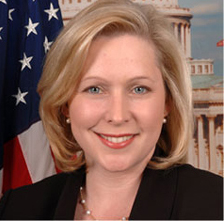
As of 2016, Approximately 320,000 TPS Recipients Live in the United States
TPS-Designated Countries Include El Salvador, Haiti, Honduras, Nepal, Nicaragua, Somalia, Sudan, South Sudan, Syria, and Yemen
U.S. Senators Kirsten Gillibrand (D-N.Y.) and Bob Menendez (D-N.J.) today with 24 Senate colleagues wrote to the U.S. Department of State and the U.S. Department of Homeland Security urging Secretaries Rex Tillerson and John Kelly to extend the Temporary Protected Status of nationals currently residing in the United States. The TPS designation is a temporary benefit aimed at providing relief to foreign nationals in the United States and countries devastated by natural disasters, armed conflict, or other extraordinary conditions.Currently, there are over 320,000 TPS holders in the United States from 10 countries with deadlines set to expire at the end of the year and beginning of 2018. These countries include El Salvador, Haiti, Honduras, Nepal, Nicaragua, Somalia, Sudan, South Sudan, Syria and Yemen.
“We urge you to review each of the designations closely, taking into consideration conditions on the ground and remaining mindful of the possibility that ending TPS and ordering the return of recipients could undermine fragile recovery efforts or put individuals in harm’s way,” the Senators wrote in their letter. “Continuing to extend TPS for the 10 currently designated countries serves our national security interests and demonstrates to our allies abroad that the United States is a leader in humanitarian efforts.”
The TPS designation is implemented through the United States Citizenship and Immigration Services and is a temporary benefit aimed at providing relief to immigrants residing in the United States who are unable to safely return to their home country. TPS can be granted in the event of an ongoing armed conflict, an environmental disaster as well as other extraordinary and temporary conditions. TPS recipients are fully vetted and are required to undergo background checks to ensure that they are not risks to public safety or national security.
Once granted TPS, individuals may not be deported, can obtain an employment authorization document and may be granted travel authorization. In addition, individuals cannot be detained by DHS on the basis of their immigration status. Today’s letter comes after Senator Menendez joined the Congressional Hispanic Caucus last week in a meeting with Secretary Kelly about the Trump administration’s immigration policies including the future of Temporary Protected Status designations. Upon questioning, Secretary Kelly was noncommittal in laying out a clear future that ensures the United States continues to show our leadership in extending protection to TPS recipients as their countries recover.
Senators Gillibrand and Menendez were joined by U.S. Senate Minority Leader Charles E. Schumer (D-NY) and Senators Edward J. Markey (D-MA), Chris Van Hollen (D-MD), Christopher S. Murphy (D-CT), Tim Kaine (D-VA), Cory A. Booker (D-NJ), Elizabeth Warren (D-MA), Sherrod Brown (D-OH), Catherine Cortez Masto (D-NV), Al Franken (D-MN), Mark R. Warner (D-VA), Jeffrey A. Merkley (D-OR), Patrick Leahy (D-VT), Richard Blumenthal (D-CT), Richard J. Durbin (D-IL), Christopher A. Coons (D-DE), Tammy Duckworth (D-IL), Mazie K. Hirono (D-HI), Michael F. Bennet (D-CO), Ron Wyden (D-OR), Kamala D. Harris (D-CA), Patty Murray (D-WA), Bernard Sanders (I-VT), and Dianne Feinstein (D-CA).
The full text of the Senators’ joint letter is included here.
Endnotes
[1] Argueta, Carla N. 2017. “Temporary Protected Status: Current Immigration Policy and Issues.” Congressional Research Service Reports & Analysis. Washington, DC: Library of Congress. (http://www.crs.gov/Reports/RS20844?source=search&guid=4bdd1a9c07f2428da30d137dc9895e66&index=0).
[2] Immigration Act of 1990, Pub. L. 101-649, 104 Stat. 4978.
[3] Baran, Amanda, Jose Magaña-Salgado, and Tom K. Wong. 2017. Economic Contributions by Salvadoran, Honduran, and Haitian TPS Holders. Washington, DC: Immigrant Legal Resource Center. (https://www.ilrc.org/sites/default/files/resources/2017-04-18_economic_contributions_by_salvadoran_honduran_and_haitian_tps_holders.pdf)
[4] Menjívar, Cecilia. 2017. Temporary Protected Status in the United States: The Experiences of Honduran and Salvadoran Immigrants. Lawrence, KS: Center for Migration Research, University of Kansas. (http://ipsr.ku.edu/migration/pdf/TPS_Report.pdf).
[5] McCabe, Kristen. 2012. “Foreign-Born Health Care Workers in the United States.” Washington, DC: Migration Policy Institute. (http://www.migrationpolicy.org/article/foreign-born-health-care-workers-united-states#5)
[6] Pew Research Center Global Attitudes & Trends. 2016. “Remittance Flows Worldwide in 2015.” Washington, DC: Pew Research Center. (http://www.pewglobal.org/interactives/remittance-map/).
[7] Menjívar, op. cit.
[8] Baran et al., op. cit.

